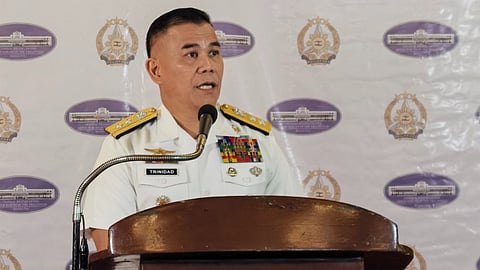
- NEWS
- the EDIT
- COMMENTARY
- BUSINESS
- LIFE
- SHOW
- ACTION
- GLOBAL GOALS
- SNAPS
- DYARYO TIRADA
- MORE

A military official raised concerns on Tuesday that a foreign power might be mapping out its espionage activities in the Philippines, following the use of fake identification documents by foreign nationals and the recent recovery of a submersible drone in the country’s waters as well as the arrest of three suspected spies with espionage equipment.
In a press conference at Camp Aguinaldo, Philippine Navy spokesperson for the West Philippine Sea Rear Admiral Roy Vincent Trinidad said the Armed Forces of the Philippines is investigating the extent of suspected espionage activities in the country.
As a first step, Trinidad pointed to the issuance of fraudulent birth certificates to foreign nationals, citing the case of former Bamban, Tarlac mayor Alice Guo, who was arrested in connection with Philippine Offshore Gaming Operator (POGO) activities while holding a fraudulent Filipino birth certificate.
“If you look at the bigger picture, last month we discovered the submersible. If we take two steps further backward, a local chief executive with a dubious character and background was uncovered and foreign nationals were arrested with fake government IDs and birth certificates,” Trinidad said.
“If you look at the entire expanse of the country, covering the different instruments of national power and start connecting the dots, there seems to be a deliberate and calculated move to map out the country by a foreign power. This is being closely monitored by your Armed Forces; we are facing this and taking appropriate action,” he said.
Trinidad noted that the suspected espionage operation follows a distinct pattern.
“And we only noticed the pattern when we started looking at the bigger picture and started connecting the dots,” he said.
Trinidad said the military, in coordination with other law enforcement agencies, is monitoring the issues which “are not yet a threat to national security but may pose a risk to public safety as well as peace and order.”
“Any information that has been derived from our seas would have political, economic, and military applications,” he pointed out.
But asked if China was behind the espionage, Trinidad said, “I do not want to speculate on anything. We base our statements on facts.”
For her part, AFP spokesperson Col. Francel Margeth Padilla echoed what AFP Chief of Staff Gen. Romeo Brawner Jr. earlier said about the military delving into the overall espionage efforts by a foreign country against the Philippines.
“As we take a step back and look at the bigger picture and connect the dots, we are considering the various siloed approaches. What was also notably mentioned by our Chief of Staff was the illegal aspect of the POGO operations,” Padilla said.
“So how everything forms part of a bigger picture, that is what we intend to achieve with all of this intel gathering that we’re doing,” she added.
Congress urged to amend espionage law
Meanwhile, Senator Risa Hontiveros and the National Security Council called for an immediate overhaul of the Philippines’ Anti-Espionage Law.
“The Senate must immediately enhance our existing Anti-Espionage Law,” Hontiveros said, while also highlighting the growing presence of Chinese ships in the West Philippine Sea.
“While China’s monster ship continues to make repeated trips to the West Philippine Sea, our government must ensure that we do not allow ourselves to be surrounded by spies,” she added.
Citing the controversial Visa Upon Arrival (VUA) scheme at the Bureau of Immigration, Hontiveros claimed that a significant number of Chinese nationals have entered the country without proper vetting.
“I have long flagged the possible presence of Chinese spies, especially when the VUA scheme was implemented at the Bureau of Immigration, which led to the Pastillas scam,” she said.
She continued: “A large number of Chinese nationals were able to enter the country without proper immigration checks because of this.”
National Security Adviser Eduardo Año, on the other hand, called for the passage of the Countering Foreign Interference and Malign Influence bill, saying the arrest of the Chinese spy and his Filipino cohorts “highlights the need for continuous vigilance, strengthened coordination among government agencies, and proactive measures to fortify our national security framework.”
“The arrest of these individuals is a stark reminder of the persistent threat posed by foreign interference and malign influence to the country,” he said.
In September last year, Defense Secretary Gilberto Teodoro Jr. said the espionage law must be amended to make it stiffer and allow the government to enforce punishment for the act being committed during “times of peace.”
Teodoro lamented that the espionage law is applicable only during “times of war.”
In October last year, Cagayan de Oro City 2nd District Rep. Rufus Rodriguez filed House Bill (HB) 10983, which seeks to amend Article 117 of the Revised Penal Code to prohibit espionage “in times of peace or in times of war.”
Rodriguez also filed HB 10988, amending Commonwealth Act 616, to impose stricter penalties for espionage, including a prison term, for any person who, “without authority, enters a war ship, fort, or naval or military establishment or reservation to obtain any information, plans, photographs, or other data of a confidential nature relative to the defense of the Philippine archipelago.”
